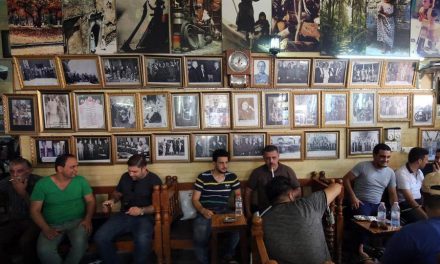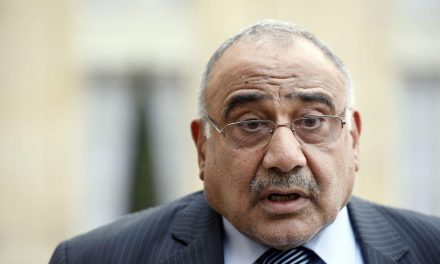A year after the parliamentary elections and six months in office, the problems facing Prime Minister Adil Abd Al-Mahdi are growing. Challenges in Iraq do not wait for its new leaders to become comfortable in their position, as every prime minister entering office in the last 15 years have gone into the job with vast problems facing them head-on. These are the most pressing challenges for Abd Al-Mahdi today.
The first challenge facing Abd Al-Mahdi is the rising tension between the United States and Iran. While this is not new for Iraqi officials, the growing threats from the Trump administration and pressure on the Iraqi Government to comply with sanctions imposed on Iran is putting Baghdad in an awkward and difficult position. Abd Al-Mahdi must tread a careful line between Iraq’s two allies but remaining impartial may not be enough to ensure American-Iranian reactions are kept out of Iraq. Iraqis may prefer to remain out of the problems of others, but trouble has reached Iraq’s doorstep, and Abd Al-Mahdi is responsible to take action and ensure violence does not take place in the country.
Abd Al-Mahdi’s laid-back approach to handling American-Iranian conflict may be deemed by some as the appropriate response needed in such a sensitive environment, yet it is definitely not the approach that is needed to deal with Iraq’s domestic issues. Little to no response has been seen from Abd Al-Mahdi to demonstrations in Nineveh and Najaf last week. The province of Nineveh already faces a mountain of challenges with post-war recovery and its provincial government is in disarray. After the removal of Governor Nofel Al-Akoub by the Iraqi Parliament’s vote of no-confidence requested by the Prime Minister, Nineveh’s Provincial Council voted on a new governor, Mansour Al-Maraid with 27 votes for, no opposing votes and 12 abstained.
When no opposition is present in voting for a leadership position, it raises red flags of corruption, such as buying the votes of provincial council members, which has caused public protests in Mosul. This is a provincial matter, but it is orchestrated by political party heads in Baghdad and Erbil and requires addressing from the Prime Minister, especially considering it was Abd Al-Mahdi that called for the vote of no-confidence on Nineveh’s former governor.
The other province witnessing chaos is Najaf. While generally calm, Najaf witnessed protests turning violent outside a shopping centre that has ties to Sadrist member, Kadhim Al-Issawi. The protests began after Al-Issawi had a falling out with Muqtada Al-Sadr, resulting in Al-Sadr calling on his followers to protests outside his mall after claiming to have exposed his corruption. The demonstrations turned violent after the mall was set ablaze and security of the facility fired back at demonstrators, killing four. The incident was resolved internally by Al-Sadr who had control over the whole matter from start to finish but faced no consequences for his actions. All that came from Abd Al-Mahdi was a statement denouncing the event that occurred and launching an investigation.
Al-Sadr once again walks free of any wrongdoing and by doing so sent a message to others that he is capable of causing havoc if he feels displeased. As a result, Hadi Al-Ameri who had been tasked by Abd Al-Mahdi to oversee the Basra file in improving services and defeating corruption, has walked away. There are multiple reasons behind Al-Ameri’s decision, but it is no coincidence it came after the events of Najaf, and the government’s weak response to hold those behind it accountable. Al-Ameri does not feel he has the reassurance to carry on his work and this should be a big concern for Basra, because if Hadi Al-Ameri and his Badr Organization feel threatened or calculated that they have more to lose at attempting to help Basra, then few will be willing to take on the task.
The concerns of governors and local governance in the provinces should be resolved starting with holding overdue provincial elections. While provincial elections were once again postponed late last year to 2019, it is now most likely that the earliest they will be held is in 2020. The provincial councils are in dire need of change and require a lot of work to ensure free and fair elections can be held for citizens to make that change. Abd Al-Mahdi cannot trust the reinstated members of IHEC who were responsible for the crisis of last year’s parliamentary elections to continue in their role.
On top of these problems concerning foreign and provincial politics, there has been a recent phenomenon where farmers’ crops have been set on fire across multiple provinces, resulting in huge losses for local agriculture. The harmful effect Iraq’s disenfranchised farmers can have on the state of the country has been well documented and it is one more issue that Abd Al-Mahdi and his incomplete cabinet have to deal with.
Iraq at this juncture of its history requires a decisive leader. It will require both political will and power to resolve these crises and the outcome will reveal if Prime Minister Adil Abd Al-Mahdi has either.

Hamzeh Hadad
Hamzeh Hadad is an Iraqi writer and commentator. He is currently a Master of Arts candidate at the Norman Paterson School of International Affairs.










